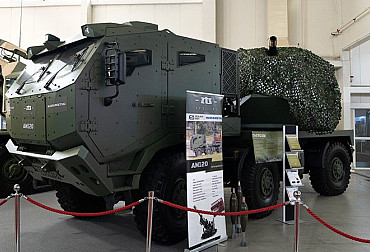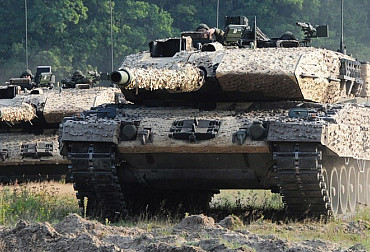A professional among professionals: a Czech soldier's view into the upper echelons of U.S. Army career education
Education is the foundation of everyone's skills and abilities, and being a military professional means a lifetime of working on your knowledge, skills and abilities. If you grew up in the environment of the 4th Brigade Combat Team's "Defense of the Nation" (4th BCT) units, it makes sense that its motto "where others fall short" would become part of your DNA, and you take the challenge of being sent to the United States Army Sergeants Major Academy (USASMA) to obtain a high-quality education as a task where you must not fail. Notwithstanding the fact that we have been sending Army Warrant Officers to this school since 2004, you will find only up to ten graduates of this prestigious school in the current ranks of the Army, and I personally am the third Chief Warrant Officer of the 4th Armoured Division to be given the opportunity to study at this school.

This school is the culmination of the U.S. Army's NCO Career Education System, lasts 11 months and prepares U.S. Army members to serve as chief warrant officers and qualified professionals at the tactical, operational and strategic levels. The Class of '73, with the motto "Motivate and Serve," then became my educational challenge as well, where more than 60 international students and more than 500 U.S. Army members faced the rigors of five different departments with the single goal of building the best-prepared elite of the backbone of all armies, members of the Sergeant Major "Silver NCO" rank corps. For international students, this school begins with preparation, the "pre-course", as you not only face the challenges of understanding and learning the U.S. Army doctrines, but you also face the challenges of a different school system and education.
"Pre-course" - treatment with shock and essay
Pre-course, or part zero, starts about a month earlier than the course itself and has one goal - to lay the best possible foundation for understanding the system of teaching, exams and work in the course itself. There were 18 students in my class and we were put in charge of two military instructors, SGM Poole and SGM Pittman. My classmates came from places like Canada, Japan, Belize, Taiwan, Brazil, Georgia, Liberia, Moldova, Uganda, and of course the U.S. As each international student had a "sponsor," a buddy who helps you adapt more quickly to the teaching system and the overall running of the school. Apart from the three English tests that I had to take before my deployment and another English test a few days after my arrival to check my language skills on the spot, then further on in the pre-course you also take a test on English grammar, especially on writing commas, identifying main, subordinate or nested sentences. You also go through various training on cyber threats, sexual harassment, or essay writing according to the APA-7 standard. All of this combined with the change of environment, new system and organization of classes, including affiliation with the U.S. Army and understanding their standards, creates a sense in the mind set that what is in front of you is actually impossible to accomplish. However, you have no choice but to face this challenge.
It's different than being in a foreign operation and the academic challenge was never something I personally was attracted to or looked forward to, however, we do go "where others fall short" so you stop feeling sorry for yourself, bite the bullet and start working. The preparation of sub-tasks, such as presentations to the class about the Czech Republic, Operation Anthropoid or the transformation of the Czech Armed Forces from an army of compulsory military service to a fully professional army were actually a "school play" method and were a precursor of what was to come in the next 11 months of school as such. The final essay, on the topic of Diversity in the Army, was the culmination of months of preparation for the school itself and was meant to serve as a model for the much more challenging essays that awaited us later in our studies.
Department of Force Management and „Core room“
The first department and the assignment to the so-called "Core room" caused another shock, because after a month you got used to a certain team, including the instructors, and suddenly everything was different. The "Core room" was a tribal class that was not only the class for completing this "department" but also the class in which two year-long papers were completed, three PE exams, including BMI measurement, which was part of the PE exam, but also included things like volunteering for local community events. My instructors were SGM Hellstrom and Mr. Willing, who were an amazing pair of seasoned instructors. Mr. Willing had taught at the school for over a decade and his insight and experience from his previous service in the U.S. Army as a Chief Warrant Officer was more than impressive. SGM Hellstrom was a man who had dedicated his military career to the engineers, particularly the specialty of "Route Clearance Patrol", which were specially composed teams for the reconnaissance, detection and removal of improvised explosive devices (IEDs) that played a primary role in the Global War on Terror.
The change in approach and challenge with this first department was evident on day one. There were again 17 students in the class; however, compared to the preparatory course, it was the exact opposite - 15 U.S. Army students and only two international students. The other foreign student in my class was a Macedonian, currently a Chief Warrant Officer in the Macedonian Army. In the assignment of duties that took place in each class, however, in the tribal class it was for the entire school term, I volunteered for the role of the person in charge of PE. Controlled PE was every Wednesday at 6:00 am and was to prepare for the trio of subsequent Army Combat Fitness Test (ACFT) examinations, passing it was a requirement for successful completion of the school. It was a requirement for international students to attend these retakes, however if you wanted to think about passing with distinction you had to pass these retakes.
Coming back to the "Force Management" department itself, there are three essay tests, a term paper, a graded document and two presentations in less than two months. The essay test in this department was a novelty for me personally as it was 24 hours in length, where the length of this essay was between 700 and 1000 words, it had to contain at least 3 sources of citations. The test focused on understanding force deployability management, force sustainability management, and the individual's physical training system in the U.S. Army. Another key competency assessed here was the creation of an informative document that had to include specified parameters including analysis and resolution of the situation described. This document was then developed further into the commander's briefings and was a graded form of how you as a "Sergeant Major" are to bring systemic problems to the attention of your commander. This term paper was 2000-2500 words in length and had to include a minimum of five sources for citations.

The goal was to understand how the U.S. Army operates, what strategic documents it has, what the command and control hierarchy is, what the acquisition and modernization process entails, including the implementation of equipment and technology to units, and the interrelationship of these processes with the position of chief warrant officers and staff warrant officers from the tactical to the strategic level. I ultimately completed this semester with an overall grade of 93.80%, which equated to a grade of A-. However, the grade did not play a very important role for me at that moment and I was more interested in what was next, what other challenges I would have to meet. With a heavy heart it is understood that infantry wins battles, but logistics wins wars. The next department that stood before me was the Department of Army Operations, where I was personally very excited and hoped to expand my knowledge in operations planning. But more on that in the next installment...






















